“Do not be conformed to this world, but be transformed by the renewal of your mind, that by testing you may discern what is the will of God, what is good and acceptable and perfect.”
– Rom. 12:2
All posts by Mary Walker
Hulda Rees – Pentecostal Prophetess
The Holy Ghost is a gift to the Church. Hulda Rees
Hulda Johnson Rees was born in a Quaker family in rural Indiana in 1855. Since the 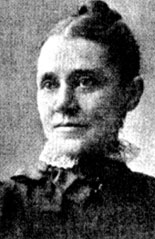 seventeenth century the Quakers have held to the equality of Christians based on their beliefs in the outpouring of the Holy Spirit on all believers. Any believer, male or female, may minister if they have been truly born again and show maturity in their faith and practice. The Quaker authorities decide if a member may preach with authority based on an examination of their lives and their testimonies.
seventeenth century the Quakers have held to the equality of Christians based on their beliefs in the outpouring of the Holy Spirit on all believers. Any believer, male or female, may minister if they have been truly born again and show maturity in their faith and practice. The Quaker authorities decide if a member may preach with authority based on an examination of their lives and their testimonies.
The Scriptures show that the Holy Spirit is a gift to men and women given to them by Christ during Pentecost. No longer would the female half of the human race be shunted aside. Women were expected to go out and witness for Jesus Christ. They were expected to imitate their Savior by caring for the poor and by proclaiming the Gospel message.
And when the day of Pentecost had come, they were all together in one place. And suddenly there came from heaven a noise like a violent, rushing wind, and it filled the whole house where they were sitting. And there appeared to them tongues as of fire distributing themselves, and they rested on each one of them. And they were all filled with the Holy Spirit and began to speak with other tongues, as the Spirit was giving them utterance.
…But this is what was spoken of through the prophet Joel:
AND IT SHALL BE IN THE LAST DAYS,’ God says,
‘THAT I WILL POUR FORTH OF MY SPIRIT UPON ALL MANKIND;
AND YOUR SONS AND YOUR DAUGHTERS SHALL PROPHESY,
AND YOUR YOUNG MEN SHALL SEE VISIONS,
AND YOUR OLD MEN SHALL DREAM DREAMS;
EVEN UPON MY BONDSLAVES, BOTH MEN AND WOMEN,
I WILL IN THOSE DAYS POUR FORTH OF MY SPIRIT
AND THEY SHALL PROPHESY. (Acts 2:1-4, 16-18)
And Peter said to them, “Repent, and let each of you be baptized in the name of Jesus Christ for the forgiveness of your sins; and you shall receive the gift of the Holy Spirit. (Acts 2:38)
In addition to the outpouring of the Spirit prophesied by the prophet Joel, Paul declares to believers that the Holy Spirit gives gifts to all Christians, male and female. The Holy Spirit gives the gifts as He wills. There is no distinguishing of gifts based on gender.
Now there are varieties of gifts, but the same Spirit. And there are varieties of ministries, and the same Lord. And there are varieties of effects, but the same God who works all things in all persons. But to each one is given the manifestation of the Spirit for the common good. For to one is given the word of wisdom through the Spirit, and to another the word of knowledge according to the same Spirit; to another faith by the same Spirit, and to another gifts of healing by the one Spirit, and to another the effecting of miracles, and to another prophecy, and to another the distinguishing of spirits, to another various kinds of tongues, and to another the interpretation of tongues. But one and the same Spirit works all these things, distributing to each one individually just as He wills. (1 Corinthians 12:5-11)
These gifts include “word of wisdom through the Spirit”, “word of knowledge”, “prophecy”, and others. Women may speak these words of wisdom as well as men.
Finally, Paul makes it clear that men and women are equal as children of God. In Christ no one gender or nationality or economic group may claim superiority over another group. No one group gets to shirk their responsibility to spread the Gospel because of the old restrictions placed on gender or nationality. In Christ, things are different.
For you are all sons of God through faith in Christ Jesus. For all of you who were baptized into Christ have clothed yourselves with Christ. There is neither Jew nor Greek, there is neither slave nor free man, there is neither male nor female; for you are all one in Christ Jesus. And if you belong to Christ, then you are Abraham’s offspring, heirs according to promise. (Galatians 3:26-29)
This is the faith that Hulda was taught in her home as a Quaker child.
Even as a child Hulda manifested strong religious feeling. Her family observed her prayers and deep commitment to Christ, so much so that her grandfather predicted that she would be a minister when she grew up.
Hulda was truly converted at age sixteen during a revival. She immediately began to preach. Initially she was very shy. Several years later she experienced a fuller sanctification as she surrendered her life to God’s control. In 1875, she was recorded as a minister in the Quaker church.
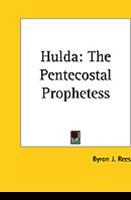 A year later Hulda married Seth Rees, also a Quaker minister. They held meetings together. They had two sons, Byron and Loring. Byron later wrote a biography of his mother: Hulda, The Pentecostal Prophetess. We are thankful that he did because Hulda did not write her autobiography, as did many other nineteenth century evangelists.
A year later Hulda married Seth Rees, also a Quaker minister. They held meetings together. They had two sons, Byron and Loring. Byron later wrote a biography of his mother: Hulda, The Pentecostal Prophetess. We are thankful that he did because Hulda did not write her autobiography, as did many other nineteenth century evangelists.
Hulda and Seth worked as pastors in Ohio and Michigan for nine months out of the year. During the summer they worked as itinerant evangelists in camp meetings throughout the Midwest and Northeast.
Here is a description of a camp meeting taken from a letter to her sister Jane. This camp would eventually become known as the Portsmouth Camp Meeting. Hulda and Seth were instrumental in establishing the camp in 1891. Hulda served as an executive member of the board until her death. The camp is still in existence in Portsmouth, Rhode Island. This glimpse into her life shows how Hulda worked with her husband and how devoted Hulda was to sharing the light of the Gospel with others.
“…. Tomorrow is the 4th and Seth asked everybody to come to the campground, men to bring teams, women to bring dinner and sewing machines and we expect to get a great deal done getting ready for the meeting. We are to have a large tent. It is such a rest to get away from home and live in a picnic way – 37 tents have been engaged already which with 8 large tents and the large tent Tabernacle which will seat 400 and the cook and eating house make quite a town. Seth has a great part of the responsibility of it all.”
Hulda’s life truly reflected the purpose for the gifts of the Holy Spirit. Spirit empowerment is not for the aggrandizement of the believer. The Holy Spirit empowers Christians to witness for Christ boldly and selflessly in works of evangelism and mercy.
Hulda died in 1898 at the age of 43. She was well known in Holiness circles as the “Pentecostal Prophetess.”
Maria Woodworth-Etter- Grandmother of the Pentecostal Movement
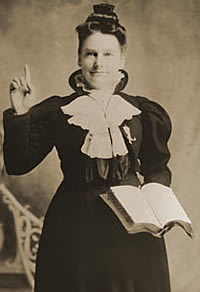 In our continuing survey of nineteenth century American women evangelists we must not leave out Maria Woodworth Etter – The Grandmother of the Pentecostal Movement.
In our continuing survey of nineteenth century American women evangelists we must not leave out Maria Woodworth Etter – The Grandmother of the Pentecostal Movement.
Maria was born to Samuel and Matilda Underwood on July 22, 1844 in Lisbon Ohio. Her parents were not religious which Maria deeply regretted. When she was twelve years old her father died of a severe case of sunstroke. Maria and her sister dropped out of school to help their mother raise the eight children in her family.
Maria desperately wanted to get an education. She had to content herself with reading her books in her kitchen. She would memorize Bible verses as she worked.
When she was thirteen years old Maria went to a Disciples of Christ church meeting. There she gave her heart to the Lord. At this time she also felt her initial call to evangelism. She did not understand this because, as she later related in her autobiography, the Disciples “did not believe that women had any right to work for Jesus. Had I told them my impression they would have made sport of me. I had never heard of women working in public except as missionaries, so I could see no openings – except, as I thought, if I ever married…”
A few years later she married Philo Harris Woodworth. Maria had six children, but five of them died while they were young. These deaths led to constant illness for Maria. During her long periods of convalescence she often had dreams of evangelizing. At one point when she was on the brink of death she promised God that if He would restore her to health she would then commit herself to the evangelistic work that He had called her to so many years before. At that moment she felt herself recovering from her illness. She then began to wonder how she could work for God by telling others about Jesus.
Not long after this her only remaining son Willie died leaving Maria and Philo with a single child, a teenage daughter, Elizabeth (Lizzie). Maria believed that all of these trials were preparation for her evangelistic ministry. Her acquaintance with grief and sorrow would give her the compassion she would need for lost sinners.
Other ministers began to encourage her to start her ministry. At first she was not sure. She said, “If I were a man I would love to work for Jesus.” These ministers assured her that she had work to do and that she should not be stopped because of her gender. Her husband Philo was not enthusiastic about her being an itinerant evangelist so she sought an opportunity to speak locally.
Maria got her first opportunity at a Friends’ meeting. When she got up to speak she was struck with a vision of hell and the danger for people who did not know their peril of damnation. She began to call for them to repent and follow God and be saved. Many cried out in repentance and came forward to receive Christ.
Wishing to obey her husband Maria held evangelistic meetings in nearby churches and communities. She received offers from several denominations to pastor one of their churches. These were local churches and the pay was good, but Maria was still determined to follow her call as an itinerant evangelist. She wanted to go wherever the Lord would lead her. When the farm failed, Maria and Philo moved to the Midwest.
Maria felt that God was urging her to pray for healing for people. She also believed that she had “the gift of healing, and of laying on of hands for the recovery of the sick.” She reported in her autobiography the stories of many hundreds of people who were healed and subsequently saved.
The numbers of people at her evangelistic meetings began to grow. Philo had agreed to accompany her but he soon began to cause trouble. He was making money on the side, which caused the media to ridicule her. He was also unfaithful in their marriage. Maria sued for divorce on the grounds of repeated adultery and divorce was granted in 1891. Philo died a little over a year later of typhoid fever.
A little over ten years later Maria married Samuel Etter. Samuel was the opposite of Philo. Maria said, “He takes the best care of me, in and out of the meetings. … He will pray and preach, and sing, and is very good around the altar…. The Lord knew what I needed and it was brought about by the Lord, through his love and care for me and the work.” They were happily married for twelve years. Samuel died in1914.
Parts of Maria’s ministry were controversial. Many did not believe that the miracles of healing were really happening at her meetings. Some believed that Maria was just being dramatic; some accused her of being a charlatan. But it is well documented that many thousands came forward and received spiritual and physical healing. While Maria faced some opposition for this, it was no more than any modern “healing evangelist” would encounter. There are doubters in every age.
A major controversy was the trances that Maria would fall into while preaching. She was sometimes in a rigid condition for 45 minutes to several hours. She could stand a long time with her face lifted skyward silently praying with tears streaming down her face over and over again for God to give repentance and salvation to the people. Maria’s trances were the subject of much debate and it was never determined for sure if they were genuine or not, but they sure drew the crowds. By the summer of 1885 the stories of her trances were well known. Maria had to increase the size of her gospel tents to accommodate the multitudes of people who would come from many miles away to hear her.
Maria enjoyed acclamation from many ministers of many different denominations. 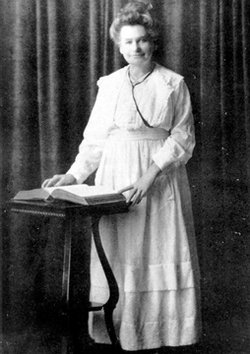 Though she was originally reluctant to speak in public because she was a woman her call to evangelistic work was unmistakable. After having a further experience of dedication of her life to God she put her complete trust in Him. She was willing to go and speak the words that God would give her. Day and night her one desire was to preach repentance and forgiveness of sins and the story of the cross.
Though she was originally reluctant to speak in public because she was a woman her call to evangelistic work was unmistakable. After having a further experience of dedication of her life to God she put her complete trust in Him. She was willing to go and speak the words that God would give her. Day and night her one desire was to preach repentance and forgiveness of sins and the story of the cross.
Maria has been called the Grandmother of the Pentecostal Movement. Thanks to her courage in following her call many received the witness of Christ. Many have been convicted of the power of the Holy Spirit. She did much to advance the role of women in ministry. Maria had a great influence on Aimee Semple McPherson, John G. Lake, F.F. Bosworth, and Kathryn Kuhlman.
For the last six years of her life from 1918 to her death in 1924 Maria worked at the church that she founded in Indianapolis. She used it as her headquarters and traveled from there to minister throughout the Midwest. This church stands today as a conference center known as Lakeview Christian Center.
She continued to speak up to her very last days. As she grew weaker she was carried to the pulpit in a chair. Finally she ministered from her bed, faithful to her calling to the end. On September 16, 1924 Maria fell into a deep sleep and went to the arms of her Savior at the age of eighty still proclaiming God’s love. Truly the epitaph on her grave reflects her life – “Thou showest unto thousands lovingkindness.”
Jennie Fowler Willing – (1834-1916)
There is neither Jew nor Greek, there is neither bond nor free, there is neither male nor female, for ye are all one in Christ Jesus. (Galatians 3:28)
No one would have expected little Jennie Fowler to grow up into the amazing woman that she did after she tumbled into a well on her family’s Illinois farm at the age of two and a half. She struck her head severely and sustained lasting nerve damage. This made it very difficult for her to study for more than a few minutes at a time.
But Jennie longed to be educated and tried to teach herself by maintaining the strict discipline of studying for fifteen minutes every day no matter what else was happening. She taught herself so well, with God’s help, that she was hired as a teacher. Her motto was “plus extra” – more beyond. She went on to write 17 books and hundreds of articles.
Jennie was converted while young. She remained a lifelong Methodist. Jennie was part of the nineteenth century “Holiness Movement”. This movement placed much importance on a person’s sanctification. Phoebe Palmer and Evangeline Booth (blog posts – June 2015) were several of the female evangelists that were also prominent during this amazing time when women were starting schools, missions, and other outreaches for the Lord Jesus.
Jennie married a Methodist minister, William Willing in 1853. They spent much of their married life 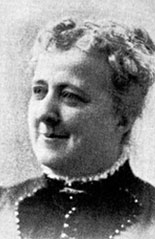 in Illinois. While William preached Jenny taught at Illinois Wesleyan University. Though women’s ordination was frowned on, William issued Jennie a license to preach. They supported each other’s work. When a small church in William’s district needed a pastor, he sent Jennie.
in Illinois. While William preached Jenny taught at Illinois Wesleyan University. Though women’s ordination was frowned on, William issued Jennie a license to preach. They supported each other’s work. When a small church in William’s district needed a pastor, he sent Jennie.
Jennie also preached in camp meetings, and poor parts of cities. She shared the love of Christ in factories and tenements. She encouraged Christians to live a disciplined, sober life. Her life was an example of what a person can do who is determined to serve Christ even with physical limitations. Today many a person with her handicap would just go on welfare and expect others to care for them. Jennie puts most of us lazy Americans to shame.
Like many of her nineteenth century Christian sisters Jennie chose to work in evangelizing and missions and social work. The growing temperance movement provided a way for women to reach out to people with needs. Women wanted to apply Christian principles to every day life for the betterment of society, and tackling the enormous problem of alcoholism was one way to do it.
Alcoholism caused much poverty especially for the women and children who were abandoned when the head of their household lost everything to drink. There were no laws protecting women. A woman had no right to her husband’s paycheck. Bartenders were reluctant to deny alcohol to their customers.
Jennie preached against the sin of alcohol. Jennie was instrumental in founding the Woman’s Christian Temperance Union. Readers will remember Frances Willard as the long time president of the WCTU (see blog January 23, 2013). Jennie served as the head of the Illinois chapter and vice president of the national organization. Eventually Jennie moved to New York where she organized the New York state chapter of the WCTU and was president of the New York City chapter of the WCTU when she died.
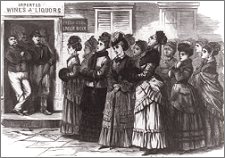 While serving with the WCTU Jennie was able to fulfill her desire to be an evangelist. Thousands of women took the opportunity to join the WCTU in order to witness for the Lord Jesus while doing temperance work. She also founded the New York Evangelistic Training School and Settlement House in 1895. This school published a magazine called “The Open Door”.
While serving with the WCTU Jennie was able to fulfill her desire to be an evangelist. Thousands of women took the opportunity to join the WCTU in order to witness for the Lord Jesus while doing temperance work. She also founded the New York Evangelistic Training School and Settlement House in 1895. This school published a magazine called “The Open Door”.
Students at the Evangelistic Training School were expected to put hands and feet with the Gospel. They spent an hour every day in neighborhood visitation, help with Bible studies, chapel services, teaching and preaching.
Jennie also had a missionary heart. She served as an officer in both the Woman’s Foreign Missionary Society (WFMS) and the Woman’s Home Missionary Society (WHMS) of the Methodist Episcopal Church.
Jennie believed that every woman whether single or married, is a missionary. She had no patience for lazy or self-indulgent women. Every woman should dedicate her time to working for the Lord. There was certainly plenty to do starting at home. Married women have the responsibility to raise their children to be moral Christians. It goes without saying that women married to neglectful husbands also have a duty to respectfully, but firmly lead their husbands to Christ.
Evangelism was very important to Jennie. Jennie wrote a monthly column entitled, “Women and Gospel Evangelism”. Her book, “How to Win Souls” is a collection of the lectures that she gave at her evangelistic training school. The school was closed in 1910 by the Pennsylvania Railroad Company so they could build tunnels. She was concerned about the need to train more evangelists and so she put her lectures into this book. In the introduction to the book, Willard Mallalieu, a Methodist bishop recommended it highly.
…. many books great and small, have been written in regard to revivals, evangelism and soul winning…
Thank God that now we have one more book, and that the product of a woman’s hand, and brain, and heart, that ought to attract the attention of all who covet the wisdom essential to be successful soul winners…
If the seventy thousand, more or less, Protestant clergymen in the United States, and as many more Christian men, and as many more Christian women would read this book, catch its spirit, follow its suggestions, and work out, in daily life, its soul winning methods, this whole land of ours would speedily become the prepared inheritance of the Lord Jesus Christ.
“How to Win Souls” was published in 1909 – over one hundred years ago. The sentiment expressed by Willard Mallalieu is still true today. If Christians would only spend even a little time every day witnessing for Christ in word and deed the world would be a better place.
Jennie served as an evangelist until her death. When she died in 1916 she was still serving in the WCTU. She was at the same time the president emeritus of the 18th Street Methodist Episcopal Church Woman’s Foreign Missionary Society. Truly Jennie embodied her motto – “plus extra” – more beyond. What excuse do any of us have to not serve the Lord now?
Quote – Prov. 28:26
“Whoever trusts in his own mind is a fool, but he who walks in wisdom will be delivered.”
– Prov. 28:26
Quote – Edward Bernays
“Those who manipulate this unseen mechanism of society constitute an invisible government which is the true ruling power of our country.”
– Edward Bernays
Quote – Edward Bernays
“The conscious and intelligent manipulation of the organized habits and opinions of the masses is an important element in democratic society.”
– Edward Bernays
Quote – Edward Bernays
“Democracy is administered by the intelligent minority who know how to regiment and guide the masses”
– Edward Bernays
Stepping Heavenward: One Woman’s Journey to Godliness (Inspirational Library Series)
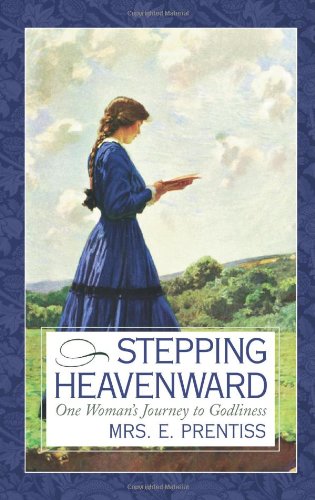
Elizabeth Prentiss wrote many books and poetry. Her children’s stories were very popular in the mid nineteenth century. “Stepping Heavenward” is one of the books that remains popular today. Elizabeth’s hymn, “More Love to Thee” expressed all that she wanted for her life. That message is timeless and many Christian women have been drawn closer to God while reading this book.
Published in 1869, within thirty years more than 200,000 copies were sold. “Stepping Heavenward” relates the theme of the centrality of our love for God in the form of a story. It appears as a diary of a woman who gives the day to day events of her life as she prepares for eternal life with God.
There are many editions of “Stepping Heavenward”. The one referenced above also contains study questions that may be used by women’s Bible studies.
The Sisters of Sinai: How Two Lady Adventurers Discovered the Hidden Gospels
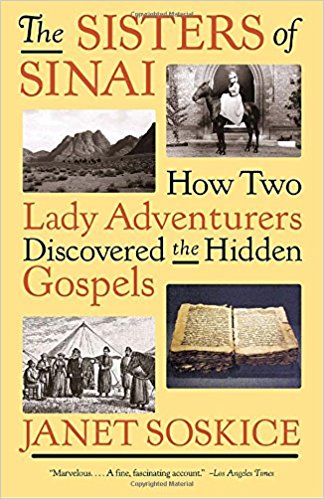
During the nineteenth century the Bible came under attack by liberal scholars influenced by the so-called “higher criticism”. Critics not only doubted the dates of the Gospels but they doubted the integrity of the text itself.
Faithful Christians never doubted that the Word of God was given by the Holy Spirit and that the Scriptures had been protected by God down through the centuries. They longed to counter the claims of the liberals but there were very few ancient copies of the Scriptures to authenticate their claim that the Bible indeed was written by Paul and other men of God during the first century.

